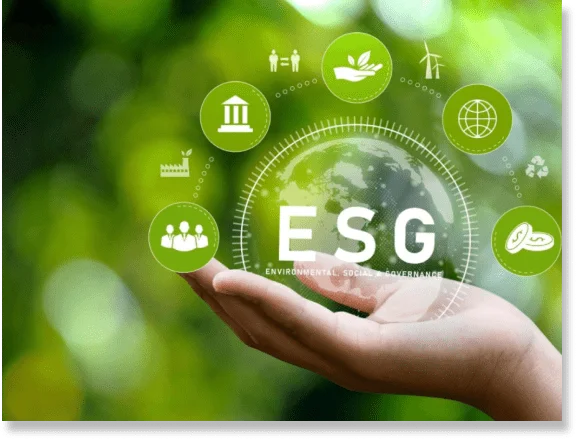Case Study | 26 August 2025
How a Global Manufacturing Conglomerate Experienced ESG Non-Compliance Issues and Shifted Toward Responsible Growth
Posted by : Shweta Singh
A leading U.S.-based manufacturing conglomerate, operating across chemicals, automotive parts, and industrial goods, came under fire in 2021 after regulators found major lapses in its compliance with ESG standards. Despite promoting itself as a sustainability-focused organization, the company was found guilty of overstating progress on emissions reduction and employee welfare. The findings prompted sharp criticism from investors, regulators, and activists, triggering a reputational crisis and loss of market confidence. To restore trust and put its business on a sustainable path, the company partnered with Research Nester to frame a comprehensive ESG strategy and put corrective measures into action.

An overview:
- The company has operated for more than six decades and holds a strong global presence in the manufacturing and industrial space.
- It had publicly committed to reaching net-zero carbon emissions by 2040 while increasing investments in cleaner technologies.
- A 2019–2020 sustainability report outlined USD 3.5 billion in planned green investments. However, audits later disclosed that many of these initiatives had been delayed or underfunded.
- The company was charged with greenwashing, as actual emissions surpassed 42 million metric tons of CO2 annually, contradicting its official claims.
- Weak governance practices, inadequate worker safety, and insufficient community initiatives added to the criticism, with more than 1,200 employee grievances filed over three years.
- Activist groups raised issues, forcing regulators to perform a detailed review that disclosed the company’s ESG disclosures were misleading and were non-compliant with international benchmarks.
- The findings resulted in an 18% fall in stock value within two months, and several institutional investors threatened to withdraw their stakes.
- To avoid further damage and secure its future, the board contacted Research Nester for guidance on building an effective ESG strategy.


The Story
Founded in the mid-20th century, the company initially operated as a small industrial supplier before rapidly widening into chemicals, machinery, and advanced manufacturing solutions. By the 2000s, it had changed into a multinational company with operations expanding in more than 35 countries, generating sales of over USD 60 billion annually. In public communications, the company positioned itself as a responsible manufacturer, claiming to prioritize the adoption of renewable energy, ethical sourcing, and employee well-being. Its annual sustainability reports highlighted promises to reduce emissions, improve labor safety, and strengthen corporate governance.
Yet behind the scenes, reality told a different story. Internal audits suggested that funds earmarked for green initiatives were frequently redirected to other business operations. Emissions monitoring was irregular, and waste management practices fell short of international benchmarks. The company also faced high criticism on the social front. Worker safety standards in factories across Asia and Latin America were not sufficient, with many accidents recorded. Trade unions stated that management ignored labor rights, while community groups charged the company with polluting local ecosystems and neglecting affected communities.
For the first time in its history, the board faced direct accountability for failing to solve climate risks and social responsibilities. The company’s stock plunged, supplier relationships weakened, and regulators increased their scrutiny. With the company’s reputation and financial stability being questionable, its leadership sought help from Research Nester to develop a recovery plan centered on ESG compliance and long-term sustainability.
Our Solution:
Research Nester’s team of analysts planned a deep-dive assessment of the conglomerate’s ESG landscape. The evaluation exposed systemic gaps in compliance, monitoring, and reporting mechanisms. Based on these findings, consultants recommended a phased and customized ESG integration strategy that solved immediate risks while building long-term sustainability. The key recommendations offered are:
Environmental Practices
- Implement a consistent system for monitoring and reporting emissions across all facilities.
- Transition of at least 40% of total energy consumption to renewables within five years.
- Adopt internationally recognized waste management standards such as ISO 14001.
- Set science-based climate goals in line with the Science-Based Targets initiative (SBTi).
Social Responsibility
- Enhance workplace safety with a target of cutting incidents by 30% by 2025.
- Launch comprehensive employee welfare programs encompassing health, training, and career development.
- Launch community engagement programs in areas impacted by industrial operations, ensuring measurable local benefits.
Governance Improvements
- Create an independent ESG oversight committee within the board.
- Publish sustainability reports in accordance with Global Reporting Initiative (GRI) standards.
- Hold structured consultations with stakeholders, employees, investors, and local communities on ESG progress.
- Introduce whistleblower protection to encourage accountability and transparency.
Technology & Innovation
- Commit USD 1.2 billion over the next five years to clean manufacturing and renewable integration.
- Use digital platforms to track ESG metrics and identify risks in real time.
- Partner with renewable energy firms to gradually phase out carbon-heavy production.
Communication & Branding
- Launch a rebranding initiative to rebrand the company as a sustainability-driven manufacturer.
- Perform quarterly updates on ESG progress to keep stakeholders and investors informed.
- Adopt transparent communication to clear doubts of misrepresentation.
Research Nester also created an extensive three-phase action plan:
- Short-Term (0-12 months): Correct compliance lapses, realign reporting, and rebuild investor communication.
- Medium-Term (1-3 years): Integrate renewables, introduce welfare initiatives, and restructure governance.
- Long-Term (3-7 years): Achieve science-based emission targets and become a recognized player in sustainable manufacturing.


Results
By mid-2022, the company began performing the planned strategy and recorded tangible improvements:
Environmental Impact
- Emissions fell by 8% in the first year, with a clear path to reduce by 45% by 2035.
20% of operations shifted to renewable energy, exceeding initial milestones. - Transparent reporting systems were introduced, putting an end to greenwashing allegations.
Social Progress
- Workplace accidents fell by 12% in a year due to improved safety measures.
- Over 15,000 employees benefited from training, healthcare, and skill development programs.
- Community programs, including scholarships and clean water access, improved conditions for more than 50,000 people near operational sites.
Governance Reforms
- The newly formed ESG committee released its first GRI-compliant sustainability report, gaining investor approval.
- Independent oversight increased accountability and reduced exposure to governance risks.
Market & Financial Recovery
- Investor confidence became stable, and threatened divestments were withdrawn.
- Stock value rebounded, rising by 25% within 18 months.
- Revenue, which had declined to USD 56 billion in 2021, recovered to USD 63 billion by 2023, with profits back on track.
- Strategic partnerships with renewable firms opened new paths of business and diversified revenue streams.
Rebuilding Reputation
- Global media coverage moved away from ESG non-compliance to the company’s renewal and transformation efforts.
- The firm was renowned in 2023 as one of the Top 100 Sustainable Manufacturers by an international industry association.
This case depicts how lapses in ESG compliance can risk even the strongest players in global manufacturing.
customized message
Shweta Singh is an accomplished Research Analyst at Research Nester Private Limited, with over six years of specialized experience in delivering high-value market research and consulting solutions exclusively within the Energy & Power sector. Her expertise covers a wide array of segments, including renewable energy (solar, wind, hydro, bioenergy), power generation (thermal, nuclear, combined cycle), smart grid technologies, battery energy storage systems (BESS), hydrogen economy, and energy efficiency solutions.
Renowned for her ability to transform complex market data into strategic insights, Shweta plays a pivotal role in supporting energy & power sector stakeholders worldwide with data-driven recommendations. She leads the development of syndicated studies, bespoke consulting projects, and customized market intelligence reports tailored to strategic client goals—ranging from product commercialization and market access planning to regulatory analysis and competitive intelligence.
Shweta holds a Master’s degree in Business Analytics from University of Petroleum and Energy Studies (UPES), providing a strong foundation to her analytical work. Her career is marked by a sharp focus on accuracy, insight generation, and client-centric delivery. She is also highly skilled in project management and team leadership, ensuring timely, high-quality outcomes across research engagements.
Thank you for contacting us!
We have received your request for proposal. Our research representative will contact you shortly.
Copyright @ 2026 Research Nester. All Rights Reserved.


